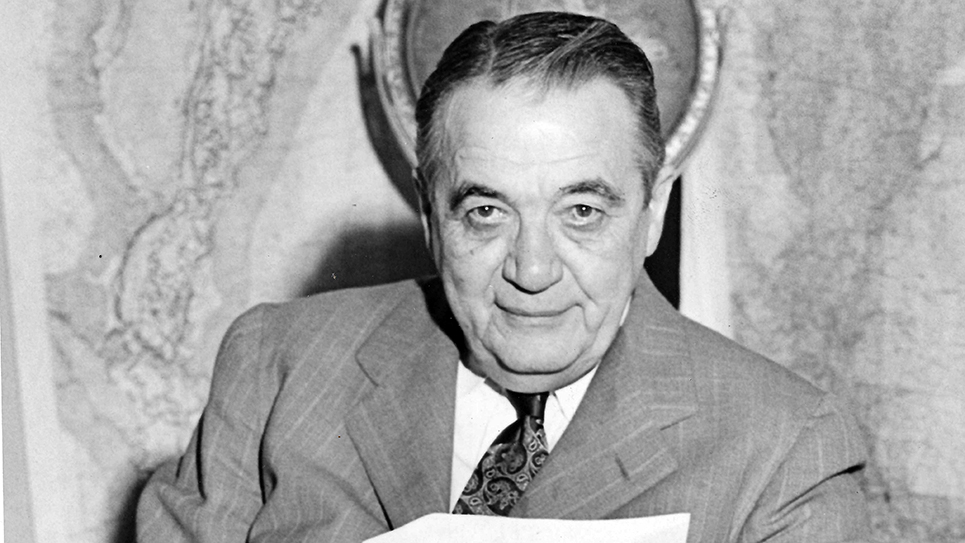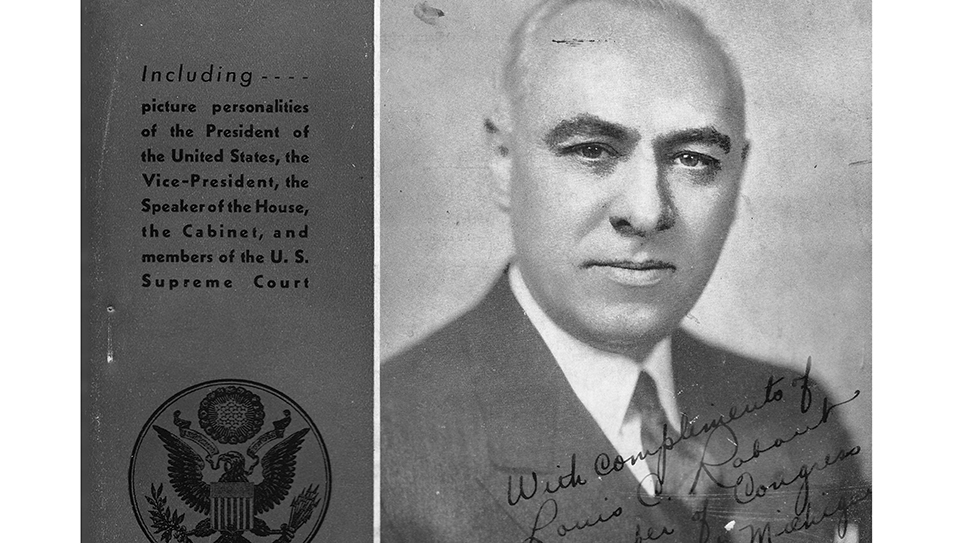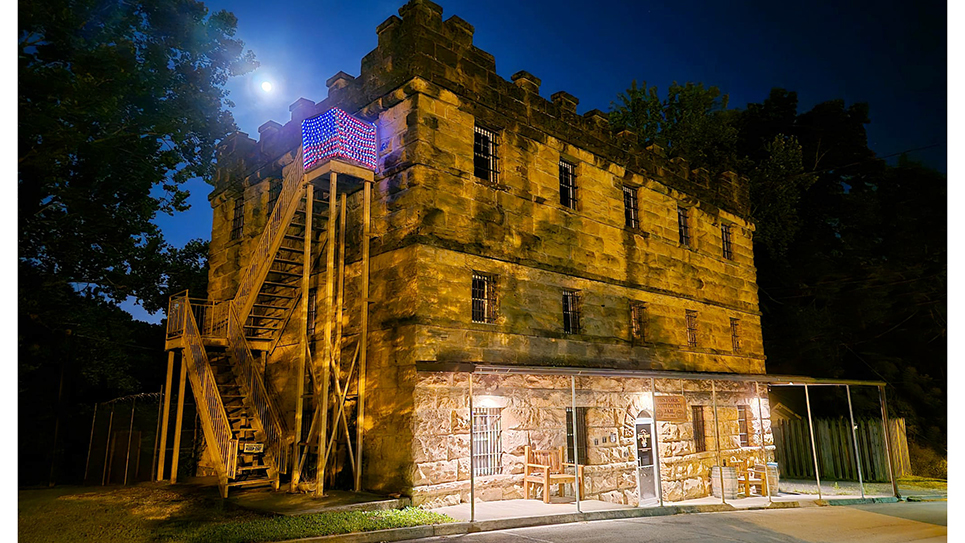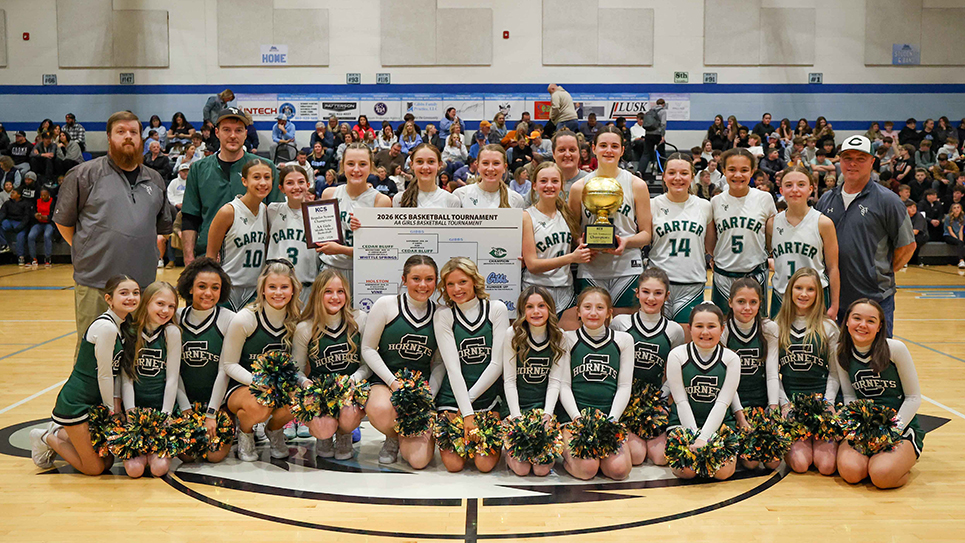The Senator From Louisiana: John H. Overton
By Ray Hill
Short and pudgy, John Holmes Overton served as United States senator from Louisiana from 1933 until his death in 1948. Throughout the first part of his senatorial career, Overton suffered from his affiliation with the notorious political machine of Huey Long. An excellent lawyer, Overton had been Long’s attorney and was elevated to Congress in 1931 when incumbent James Aswell died. Overton won the special election to succeed Aswell and, in 1932, Huey anointed his friend as the Long machine’s candidate to oust U.S. Senator Edwin S. Broussard.
Huey Long’s clarion call to make “Every Man a King,” and every woman a “Queen,” as well as his constant orations against wealth and the wealthy gave Louisiana’s “Kingfish” a national following that impressed even President Franklin D. Roosevelt, who thought Huey to be one of the most dangerous men in the country. Of course, Huey was a millionaire through his ownership of the “Win or Lose” oil company, which certainly seemed to win far more often than it lost.
Overton was the son and grandson of jurists and his great-grandfather had been a justice of the Louisiana State Supreme Court. A cousin had been governor of Louisiana during the Civil War. Overton had been a founder of the Good Government League of Louisiana, which had been formed to defy the notorious machine in New Orleans.
The assassination of Huey Long in 1935 went a long way in rehabilitating Overton’s image. Overton’s association with the Long machine receded somewhat, at least as far as most newsmen were concerned, and his reputation changed as he worked hard on behalf of the people of Louisiana and was regarded as an able member of the United States Senate. Politically, Senator Overton had done his homework and was well-liked in his home state as evidenced by his repeated victories at the polls. Senator Overton became recognized as an expert in the field of what the Shreveport Journal referred to as “waterway improvements.” Overton chaired a committee on rivers and harbors in the Senate and championed legislation and projects all of which did much to reduce the recurrent flooding all too prevalent in the South.
Senator Overton was also a champion of enlarging America’s Navy. Overton realized the precarious position of the United States as war raged all over the globe before the bombing of Pearl Harbor by the Japanese Empire. “The voice of American diplomacy will be heard only as loudly as the guns of the American nation can roar,” Overton declared in one speech on the floor of the Senate.
A member of the Senate Appropriations Committee, John Overton looked after the needs of the people of Louisiana, while working for money for the armed forces. While a partisan Democrat, Overton did not hesitate to dissent when he disagreed with President Roosevelt, who was enormously popular in the Pelican State. Senator Overton was horrified when FDR proposed to enlarge the U.S. Supreme Court and opposed it, saying he could not agree with Roosevelt because the proposal violated his own sense of “the spirit of our Constitution and ideal of our government as I understand them.”
Despite Overton’s political alliance with Huey Long, the senator was a strong-minded individual with strong likes and equally strong dislikes. One of the senator’s pet hates was daylight saving time, and Overton refused to even acknowledge the existence of what many D.C. called “fast time.” Senator Overton complained about the many inconveniences wrought by daylight saving time. Overton’s Senate office operated on the regular Eastern Standard Time, which he referred to as “God’s time.” The senator’s likes included a special coffee pot kept near his desk in the Senate Office Building, where his daughter Katharine brewed him French coffee at least four times daily, according to TIME magazine.
John H. Overton had held no elective offices prior to his candidacy in the 1931 election to succeed Congressman James B. Aswell. Overton had run for the United States Senate in 1918 in the Democratic primary, facing Congressman Edward Gay and former Governor Luther E. Hall. Overton ran third. Following the death of Congressman Aswell, Overton faced no opposition for the Democratic nomination in the special election, which in Louisiana at the time was tantamount to election.
After having represented Huey Long when the governor was being impeached, the grateful former governor chose Overton as the machine’s candidate to run against Senator Broussard. Edwin Broussard was a strong opponent of Huey Long and outspoken about his distaste for the “Kingfish.” Broussard accused Long of having “bought the legislature,” controlling every department and agency in Louisiana, and intimidating “the business people.” “If you don’t believe that the business people have been intimidated,” Broussard cried, “ask your banker.” Broussard insisted Huey Long had been “elected to the United States Senate by the greatest fraud, deceit and corruption in the history of the state.” Senator Broussard pointed a finger at John Overton, saying his opponent was at the very least complicit in Long’s political maneuvering. “In all these actions he has been advised by John Overton and everything I say about Long applies to Overton with equal force,” Senator Broussard said.
John Overton was able to give as good as he got. An able and nimble public speaker, Overton had the full backing of the formidable Long machine. Unlike Huey, who cultivated a “man of the people” image and a frequently vulgar character, John Overton was more aristocratic and polished. Overton was more dignified than Long and some of those supporting Senator Broussard sought to make Huey the issue. Shreveport’s Mayor George W. Hardy told one audience, “The issue is Huey P. Long. John Overton is the shadow, the puerile instrument used merely to further the purposes of Huey Plundering Long.”
John Overton had been instrumental in helping Huey Long’s rise to political prominence in Louisiana. Overton had been one of the original leaders of Long’s successful gubernatorial campaign. John Overton had been chief counsel to the governor when the effort was made to impeach Huey Long. When Long ran to unseat Senator Joseph Ransdell, Overton was once again one of the governor’s top political leaders. Long’s backing of John Overton, first to succeed Congressman Aswell, and then for the United States Senate was the repayment of a political debt owed.
The 1932 senatorial campaign had been rough, even by Louisiana standards. Senator Broussard had written an open letter to Overton demanding to know where the congressman stood on the question of prohibition.
The 57-year-old Overton won the Democratic primary easily, carrying every parish (county) in Louisiana and winning quite nearly 60% of the ballots cast. Senator Broussard, despite having lost badly, immediately claimed he had been the victim of voter fraud. Broussard filed a complaint with the Senate, which is the final arbiter of who may sit in that august chamber.
A special committee was formed to hear the complaint and investigate. The colorful Tom Connally of Texas was named chairman of the committee and went to Louisiana and conducted an investigation into Huey Long’s political machine. The Texan issued a blistering report, labeling the Long organization as “vicious, deplorable, and damnable.”
“I advise anyone who thinks he knows something about politics to go down in Louisiana and take a post-graduate course,” Connally told his colleagues.
Overton immediately declared victory, saying the report “completely absolves me from any wrongdoing.”
“I hope the senator won’t conclude that we’re giving him a complete bill of health,” Tom Connally retorted.
With Huey Long felled by an assassin’s bullet in 1935, John Overton became Louisiana’s senior United States senator. It was a role Overton filled admirably as he enjoyed his work in the Senate. Senator John Overton faced the voters once again in 1938. Overton’s political skills were ample enough to have helped entrench himself. The senator faced no opposition inside the Democratic primary and was reelected.
One reason for Overton’s popularity with the people of Louisiana was his ability to ladle out the largesse of the New Deal on his state. The Roosevelt Administration had rightly viewed Huey Long as a serious threat and had done what it could to undermine the Kingfish. John Overton was a more traditional Southern Democrat and not objectionable to FDR. Overton’s dedication to eliminating “the menace of floods” in Louisiana and the country was also highly popular with his grateful constituents.
In 1944, John H. Overton was 68 years old and in questionable health. The senator abruptly announced he would not seek reelection. Overton’s junior colleague from Louisiana, Allen J. Ellender, hurriedly drafted a letter urging that Overton run again; it was signed by 46 of Overton’s Senate Democratic members. Senator Overton changed his mind and announced he would run for a third term. Overton easily dispatched three opponents for the Democratic nomination with better than 61% of the vote without waging a strenuous campaign.
When Earl K. Long, brother of the late Huey, sought the governorship, Senator Overton refused to support him inside the Democratic primary, saying to do so would have betrayed his original patron. Unfortunately, the 72-year-old senator was ailing. Three days after Long’s inauguration, John Overton died in Bethesda Naval Hospital.
John Overton had been working at his office, but the following day remained at home, complaining of not feeling well. The senator’s condition grew worse, and he was taken to Bethesda Naval Hospital, where doctors quickly diagnosed that Overton was suffering from an intestinal blockage. The senator underwent surgery, and the following day, a report was issued saying doctors assessed the senator’s condition as “satisfactory.” The operation was quite serious, and the next report was that the senator had rested comfortably during the night and his condition was “no better and no worse.” Family and friends were encouraged by Overton’s reaction to the surgery, although his condition was still assessed as “critical.” One Louisiana newspaper reported, “His general condition is slightly better this morning,” according to the hospital. Unfortunately, it did not remain that way.
A day later, Louisiana newspapers began reporting the senator had pneumonia. That was followed by reports that Overton was gradually becoming weaker. On May 11, 1948, the Shreveport Times blared on its front page that the senator was worse and “his chances for recovery are now considered ‘poor.’” The bulletin noted the senator was considered “critically ill” by Bethesda’s physicians. Evidently, the senator’s heart was having trouble enduring the trauma inflicted on his aging body, and the result caused a “circulatory failure.” The senator had suffered several heart attacks over the preceding five years, and he began to fade. The end came at approximately 3:50 a.m. on May 14, 1948. John Overton’s wife Ada and daughter Ruth were at his bedside when he slipped quietly away.
Senator Clyde Reed, a cantankerous man representing Kansas in the U.S. Senate, walked over to the Democratic side of the aisle in the Senate Chamber and placed a vase of red gladioli on John Overton’s desk. His voice was “choked with emotion” as he told his colleagues “these flowers are so symbolic of the strength and character of John Overton.”
Mrs. Overton chose not to have any service in Washington, D.C., preferring to return home to Louisiana. The senator’s body was taken home to Alexandria, Louisiana, by train. A hearse bore the earthly remains of Senator John H. Overton in a copper casket into the two-story home he had lived in for more than a quarter of a century. It was common at the time for a body to be placed inside the parlor of one’s home and Senator Overton lay in repose inside his home and most of the downstairs rooms were packed with floral tributes. At the head of the senator’s coffin was a floral arrangement of pink peonies sent by President Harry Truman. At the senator’s feet were white gardenias from his colleagues in the Senate.
The Shreveport Journal eulogized Senator Overton in an editorial published after his death. “John H. Overton proved his invaluable worth by his effort in every role he filled in a life of brilliant accomplishments.”
© 2025 Ray Hill







